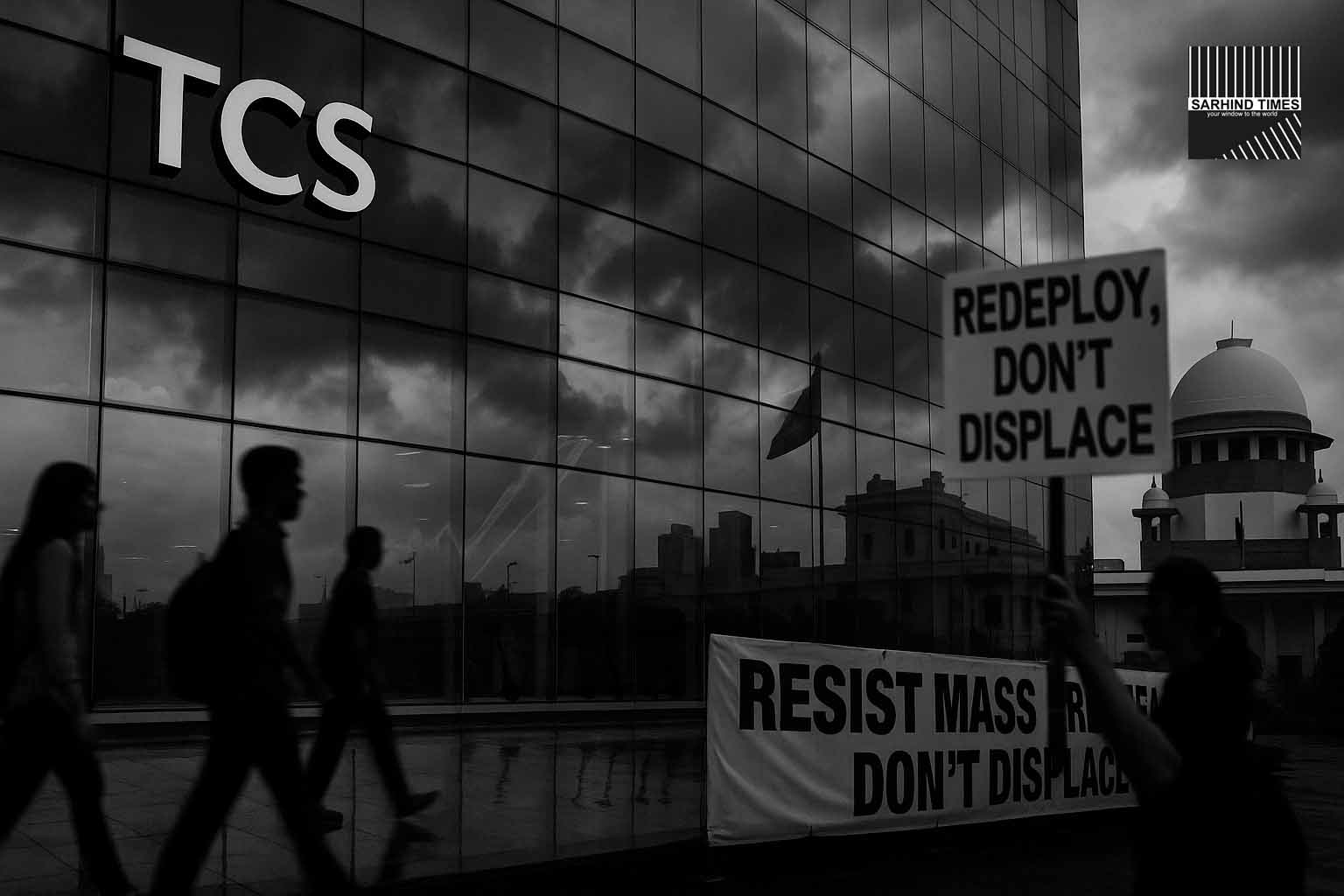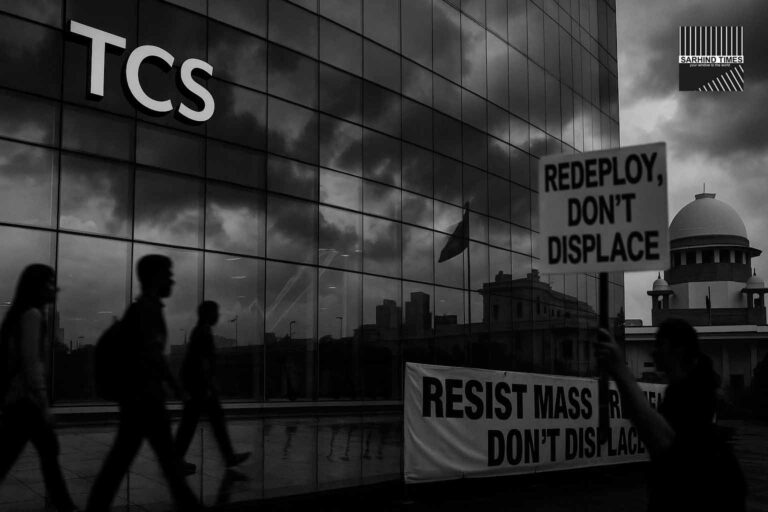India’s largest IT services firm faces rare worker unrest amid automation, AI transition, and project realignments
(By Sarhind Times Business Bureau | Bengaluru | October 17, 2025)
Bengaluru — Industry Bellwether Faces Workforce Dissonance
Tata Consultancy Services (TCS), India’s largest IT services exporter, has initiated talks with a regional tech employees’ union after a week of street protests alleging job losses and unfair redeployments.
The Karnataka-based Union of IT and ITeS Employees (UNITES) submitted a petition claiming that up to 20,000 employees had been “forcibly separated” under the guise of performance management and project realignment.
While TCS has not confirmed any retrenchment figures, the development marks a rare moment of visible tension within India’s traditionally non-unionized white-collar IT sector.
“We have shared affidavits and case studies of employees who were off-boarded without due process,” said UNITES General Secretary Girish Mallya. “We want clarity and fairness in how workforce transitions are managed.”
A Rare Flashpoint in India’s IT Heartland
Protests erupted earlier this week outside TCS’s Bengaluru and Chennai offices, where placard-bearing employees demanded state government intervention and transparency in HR policy execution.
In a brief internal memo, TCS acknowledged “concerns raised by certain external groups” and said the company remains committed to dialogue and career reskilling programs amid industry transformation.
“TCS has always prioritized redeployment over layoffs,” the note stated. “We continue to align our workforce with evolving business and technology priorities.”
However, the scale of the allegations — 20,000 job cuts — has triggered public and investor attention, with analysts stressing the need for clear communication from management.
Unionization in the White-Collar Sector: A Historic Shift
India’s IT industry, employing over 5 million professionals, has traditionally operated outside the conventional trade union framework that governs manufacturing or public sector jobs.
The current episode, therefore, is more than a company dispute — it symbolizes a generational inflection in how white-collar labor rights are being perceived.
“Tech professionals have long been viewed as immune to organized bargaining,” said Dr. Rajeev Gowda, labor economist and former MP. “But as automation accelerates and job security erodes, the collective instinct is returning.”
UNITES, which earlier represented employees during the Cognizant and Tech Mahindra redeployment drives, claims over 4,000 new registrations since the TCS protests began.
Automation, AI, and the Shifting Workforce Equation
Industry experts point to AI-driven efficiency models as a key disruptor.
With generative AI tools automating code, documentation, and support functions, global IT firms have begun reshaping workforce pyramids — favoring specialists over volume headcount.
- AI Productivity Impact: A 2025 Nasscom study found that 30–40% of entry-level IT roles are now partly automated.
- Skill Realignment: Firms are investing heavily in reskilling mid-level engineers for AI, cybersecurity, and cloud architecture.
- Margin Pressures: With U.S. tech clients tightening budgets, companies are compelled to optimize project costs.
“This isn’t a TCS problem alone — it’s a global structural shift,” said Vivek Wadhwa, tech analyst and author. “But how companies communicate and support transitions matters enormously.”
Inside the TCS Response
According to internal sources, TCS is reviewing multiple aspects:
- Redeployment Pipelines: Mapping unassigned employees (“benched” staff) to new AI-related projects.
- Performance Management Norms: Revisiting metrics criticized as opaque.
- Dialogue Framework: Exploring a formal consultation channel with employee representatives — a first for TCS.
“We are listening,” a TCS executive told Sarhind Times on condition of anonymity. “Our intention is to evolve responsibly, not abruptly.”
State Government and Legal Oversight
The Karnataka Labour Department has acknowledged receipt of the union’s petition and may seek clarifications under the Industrial Disputes Act (1947) if prima facie evidence of unfair termination exists.
Legal experts say this could test the boundaries of India’s new labor codes, which have yet to be fully enforced across service industries.
“The question is whether IT employees qualify for the same procedural protections as industrial workers,” said Advocate Nandita Rao, a labor law specialist. “The outcome could set precedent for the entire tech sector.”
Investor Lens: Stability and Transparency
TCS shares remained flat at ₹3,980 after initial volatility, with investors viewing the protests as a temporary reputational event rather than an operational crisis.
However, fund managers stress that perception risk is real, especially in an industry long associated with stable employment and brand integrity.
“IT firms are custodians of India’s white-collar dream,” said Ramesh Damani, veteran investor. “Even symbolic unrest can dent sentiment.”
TCS is expected to issue a formal clarification during its next quarterly results briefing, addressing workforce restructuring and utilization metrics.
Industry-Wide Pattern: HR Reset in Motion
TCS is not alone. In recent quarters:
- Infosys reduced lateral hiring and delayed onboarding.
- Wipro initiated “project-based workforce optimization.”
- Tech Mahindra rolled out “AI readiness” programs replacing repetitive tasks.
Across the board, companies are flattening their workforce hierarchies, reallocating human capital toward cloud, analytics, and AI consulting, while pruning legacy skill pools.
“The pyramid model is being inverted,” said Sangeeta Gupta, senior VP, Nasscom. “The goal is fewer coders, more creators.”
Employee Voices: Between Pride and Anxiety
For many within TCS, the issue is not just numbers but transparency and dignity.
“We understand business pressures,” said one mid-level engineer who joined protests anonymously. “But overnight exits and unclear appraisal terms shake trust.”
Others expressed solidarity but hesitation, wary of challenging a company long seen as a “dream employer.”
“TCS built our careers,” said a project lead in Chennai. “We hope the dialogue leads to reform, not confrontation.”
Corporate Culture and Communication Gaps
Analysts attribute the unrest partly to communication breakdown during large-scale digital transformation.
“TCS’s culture is deeply hierarchical,” noted Dr. Shailaja Rangarajan, organizational behavior expert at IIM Bangalore. “As AI disrupts middle layers, uncertainty rises faster than information.”
Companies that proactively communicate skill transitions — through transparent metrics and retraining guarantees — fare better in retaining morale.
Union Demands: A 6-Point Charter
UNITES has proposed a six-point charter to TCS management and the Karnataka government:
- No forced separations without written justification.
- Transparent redeployment with skill-matching audits.
- Compensation packages for displaced employees.
- Grievance redressal committee with employee representation.
- Periodic disclosures on bench and attrition statistics.
- Government mediation in large-scale layoffs.
“We’re not anti-company,” said UNITES president Leena George. “We seek structured accountability in a sector that often hides behind contracts.”
The Tata Ethos: Legacy Under Scrutiny
TCS’s handling of the situation carries symbolic weight given its Tata lineage, associated with ethical business conduct and employee welfare for decades.
Historically, the Tata group’s labor relations — from steel to software — have emphasized dialogue and fairness.
“The Tata name stands for trust. We hope TCS lives up to that tradition,” said Prof. Subir Gokarn, corporate historian.
The group’s internal code of conduct mandates “respect for all stakeholders, including employees.” Observers expect the parent conglomerate’s ethos to influence resolution strategy.
The Bigger Picture: Tech Labor in the AI Era
The protests spotlight a paradox facing India’s $250-billion IT industry:
- It is the engine of global digital transformation, yet its own workforce feels disrupted by the same technology.
- It champions AI for clients, but wrestles with AI anxiety at home.
“India’s IT workforce must move up the value chain, not out of the system,” said Kris Gopalakrishnan, Infosys co-founder. “Reskilling is the new job security.”
TCS, which trains over 100,000 employees annually, has invested in platforms like “Elevate” and “Talent Next” for continuous learning — a model now under pressure to prove its resilience.
Expert Analysis: Lessons for Industry
- Proactive Dialogue: Employee engagement must evolve from feedback forms to real consultations.
- AI Integration Ethics: Companies must communicate how automation decisions affect workforce structure.
- Data Transparency: Regular publication of attrition and redeployment figures can prevent rumor-driven panic.
- Union Recognition: While still nascent, responsible union dialogue could become part of modern HR governance.
“The Indian IT sector is entering its labor maturity phase,” observed Ruchira Das, HR consultant. “Balancing agility with empathy will define its future.”
Market Impact and Investor Watchpoints
| Stock | Current Price (₹) | 1-Day Change | YTD |
| TCS | 3,980 | -0.3% | +12% |
| Infosys | 1,657 | -0.2% | +8% |
| Wipro | 612 | -0.1% | +6% |
| Tech Mahindra | 1,392 | -0.4% | +4% |
Brokerages are advising “neutral to hold” positions on IT majors until the labor narrative stabilizes and visibility on new contracts improves.
Voices from Academia and Policy
“This will accelerate debate around white-collar labor laws,” said Prof. Meenakshi Sundaram, National Law School of India. “India must update frameworks to reflect the gig- and AI-driven realities of tech employment.”
Policy experts believe that structured engagement — not confrontation — will determine whether India’s digital economy remains a talent magnet or turns into a churn machine.
Conclusion: Dialogue in a Disruptive Decade
The TCS-UNITES dialogue is more than an industrial episode — it’s a mirror of modern India’s work transformation.
As AI, automation, and global uncertainty reshape the corporate landscape, the human contract between employers and employees is being rewritten in real time.
If resolved with transparency and fairness, TCS’s engagement could become a template for ethical transition in tech workplaces worldwide.
If not, it risks deepening mistrust at a time when the Indian IT brand — built on talent and trust — can least afford cracks.
For now, both sides are talking — and that, in itself, is a start.
#TCS #ITJobs #TechIndustry #Employment #Bengaluru #ITServices #IndiaInc #Automation #AI #CorporateEthics #LabourRights





















+ There are no comments
Add yours